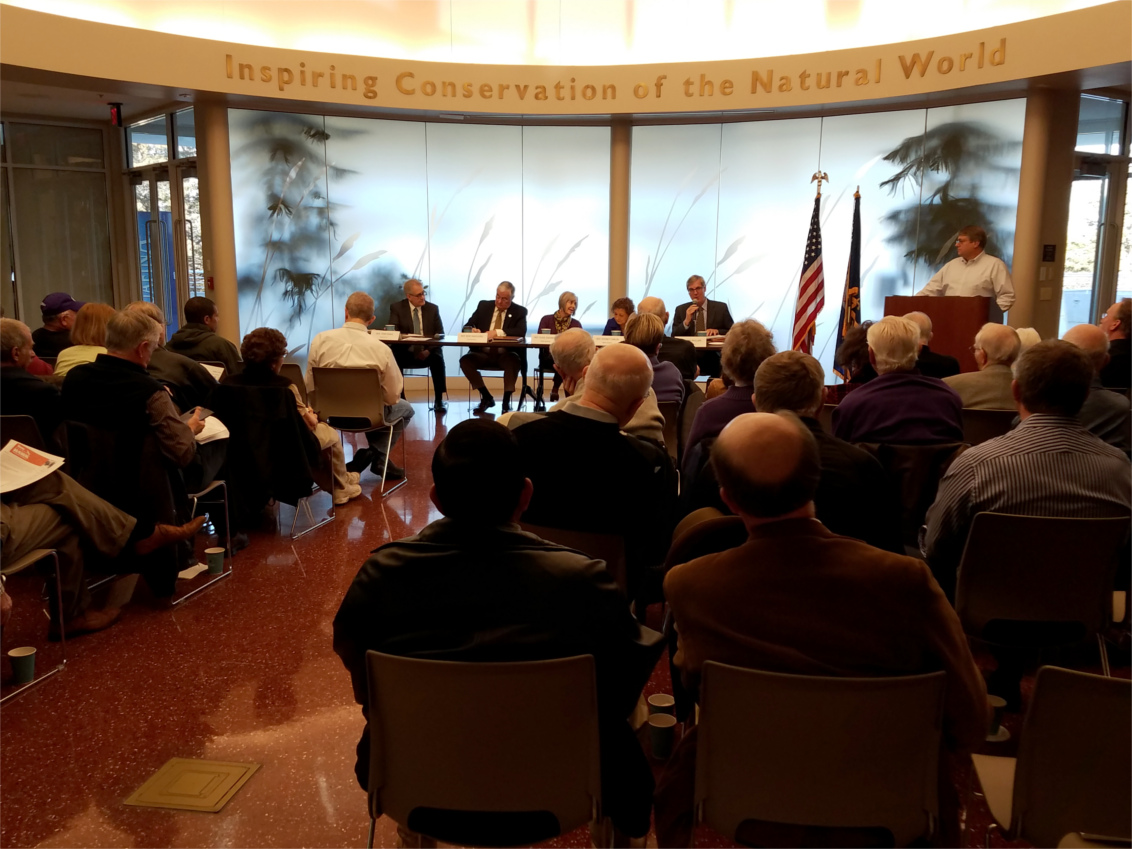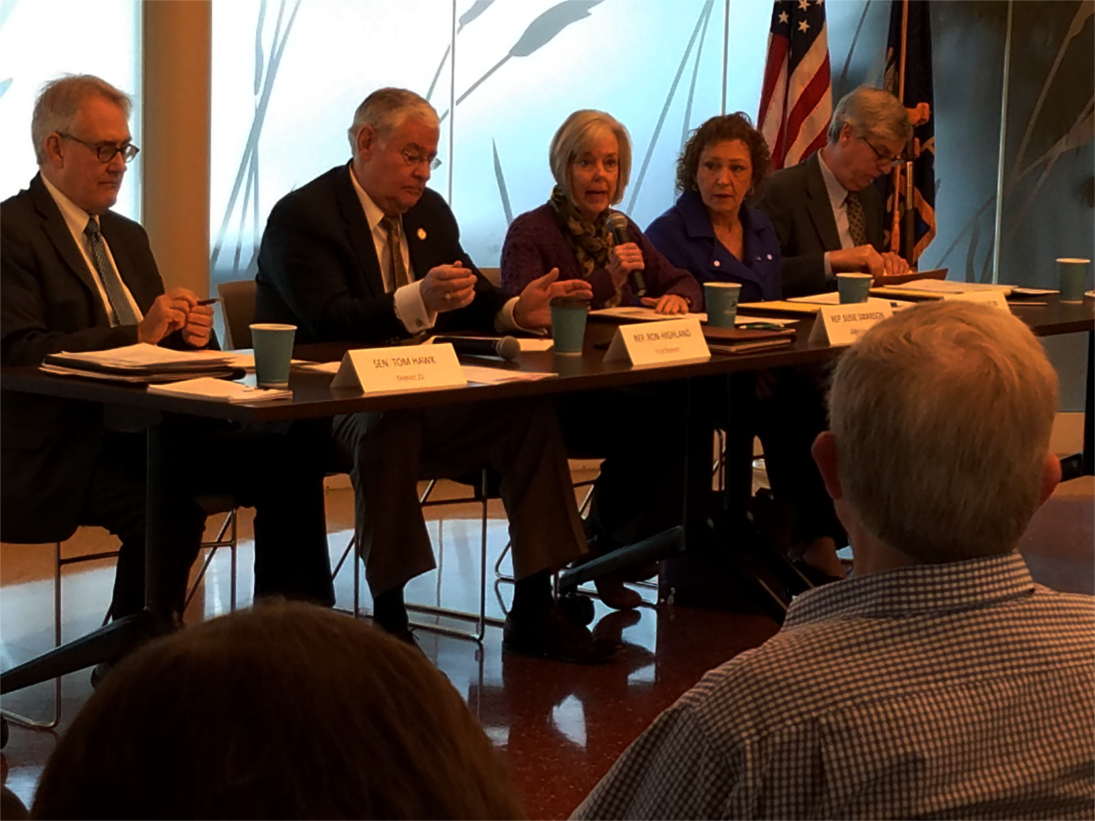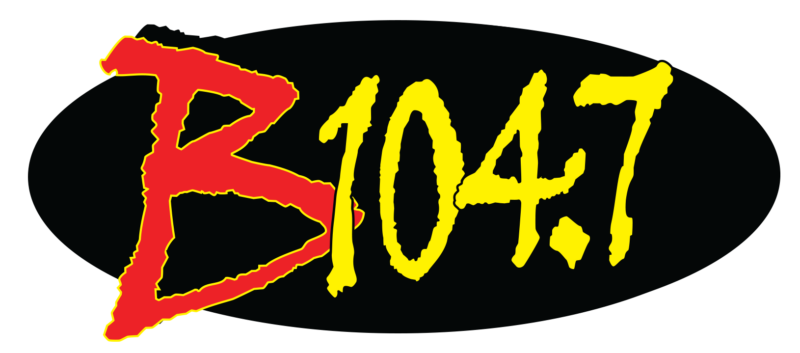
Area lawmakers speak to constituents Saturday morning inside the Sunset Zoo Educational Center in Manhattan for the first “Legislative Coffee” session of the year. (Staff photos by Brady Bauman)
Rep. Tom Phillips summed it up best for his colleagues Saturday morning, when speaking in front of constituents for the first “Legislative Coffee” session of the year inside the Sunset Zoo Educational Center in Manhattan.
“We’ll just have to see how this plays out — I’ve never seen anything quite this challenging,” the Manhattan Republican said, speaking about the state’s budget woes. “But, we got to do it. I just keep telling myself, like (K-State football coach) Bill Snyder says, ‘Keep sawing the wood,’ and that’s what we got to do.”
The event, organized by the Manhattan Area Chamber of Commerce, is a longtime staple in the Little Apple and allows legislators to answer prepared questions from constituents in a panel setting.
Phillips and Democratic Rep. Sydney Carlin — also of Manhattan — were present, along with Rep. Ron Highland of Wamego and Rep. Susie Swanson of Clay Center, who are both Republicans. Democratic Sen. Tom Hawk of Manhattan was also present.
Phillips, Carlin, Swanson and Hawk supported Wednesday’s efforts to override Gov. Sam Brownback’s veto of a tax bill that would have restored income taxation to pre-2012 levels. Highland, however, differed, and voted in support of Brownback’s veto.
The state faces projected budget shortfalls totaling nearly $1.1 billion through June 2019.

Rep. Susie Swanson of Clay Center, center, speaks to constituents Saturday morning inside the Sunset Zoo Educational Center in Manhattan. Also pictured, from left, Sen. Tom Hawk, Rep. Ron Highland, Rep. Sydney Carlin and Rep. Tom Phillips.
“We got to just keep working at this until we figure it out,” Phillips continued. “It’s just too darn critical to all of you and to our children to fix this situation for our state. I do remain optimistic and we’re going to have to make tough decisions — and they’ll probably be the very decisions that could be the reasons why we’re elected out of office.
“But you can’t make leadership decisions based on political careers. It’s time to be leaders in the state and do what we think is right.”
Highland said he wants compromise and more information.
“What we need to do is work together and figure out what’s best for the people and what’s best for the state of Kansas,” Highland said. “Does that mean it’s going to be exactly what I want? Absolutely not. And will it be exactly what someone else wants? No. We will have to compromise. But we’re not to that stage yet.
“We do not know how much money is needed. Once we get that information, then we will sit down and look at a plan not only for the short term, but for the long term for our state.”
Hawk followed with a referral to recent comments by Riley County Commission chairman Ron Wells, who aired his frustrations with the state Thursday concerning the substantial decline in funds the state is statutorily-required to transfer to cities and counties.
“For our county commissioners, I want you to know I do support the demand transfer(s),” Hawk said. “But before we can do the demand transfer that sends the money back that we agreed to send back to our counties to reduce our property taxes, we have to have a structural budget fix.
“We have to get the state’s house in order.”
The concealed carry of firearms on college campuses was also brought up to lawmakers. Starting July 1, public universities in the state must allow anyone 21 or older to have concealed firearms on campus in buildings that don’t have security measures, including metal detectors.
“I didn’t vote for that bill when it first came through, particularly in light of the fact we have removed all training for concealed carry — it’s not appropriate to allow concealed carry in our university buildings,” Phillips said.
Carlin said college campuses are for learning and that pressures students face in school mixed with the concealed carry of firearms is a dangerous mix. Swanson said Gen. Richard Myers, the president of Kansas State University, is against the measure and added that if concealed carry isn’t allowed on Fort Riley, it shouldn’t be allowed in classrooms.
“They’re not allowed to carry concealed guns on post — why’s that?” she said. “Gen. Myers is opposed to carrying guns on campus and also I believe our police department is opposed to it, so those would be my guiding principals there.”
Highland, who is on the Federal and State Affairs Committee where gun laws are discussed, said concealed carry on campus is a difficult issue.
“It’s very emotional for people,” he said. “And I can guarantee you of the 600 emails I received in one day (about it) they were half and half. Those that are for implementing a law that would restrict, and then those who were adamantly for allowing this.”
When it came to funding for public education, lawmakers said much of what happens next depends on what the state Supreme Court will rule on the ongoing lawsuit against Topeka in terms of financial adequacy.
Begrudgingly, Phillips said another year of block grant funding may be in the cards.
“I feel that I would rather extend the block grants for one year, as opposed to being pressured to make a bad decision on a bad bill,” he said. “If we need a little bit more time to write the correct bill or a better bill, I say let’s do that and not put ourselves boxed into a corner where we have to vote on what I think could be bad legislation.”
Lawmakers also voiced support for an increase in the state gas tax to help pay for road improvements, but all admitted it would be a tough sell in the statehouse.
Carlin also voiced support for greater internet access in the state, especially for rural communities.
Still, the state’s budget hole was a dark cloud in the room, even though all expressed their optimism about the new blood elected to the legislature in November. The continued budget deficits blocked out the bright shining sun the governor has often described when speaking about the Sunflower State’s finances.
“This is a tough, tough year,” Swanson said. “We have some huge decisions to make that have an impact on every Kansas citizen. In terms of the career politician mentality — I was retired for seven years before I got this job. I was a happy grandma.
“If I don’t get re-elected, I’ll be a happy grandma again. I’m going to make the votes I think need to get made to get our state turned around.”
The post State budget crisis sobers Legislative Coffee gathering appeared first on News Radio KMAN.

